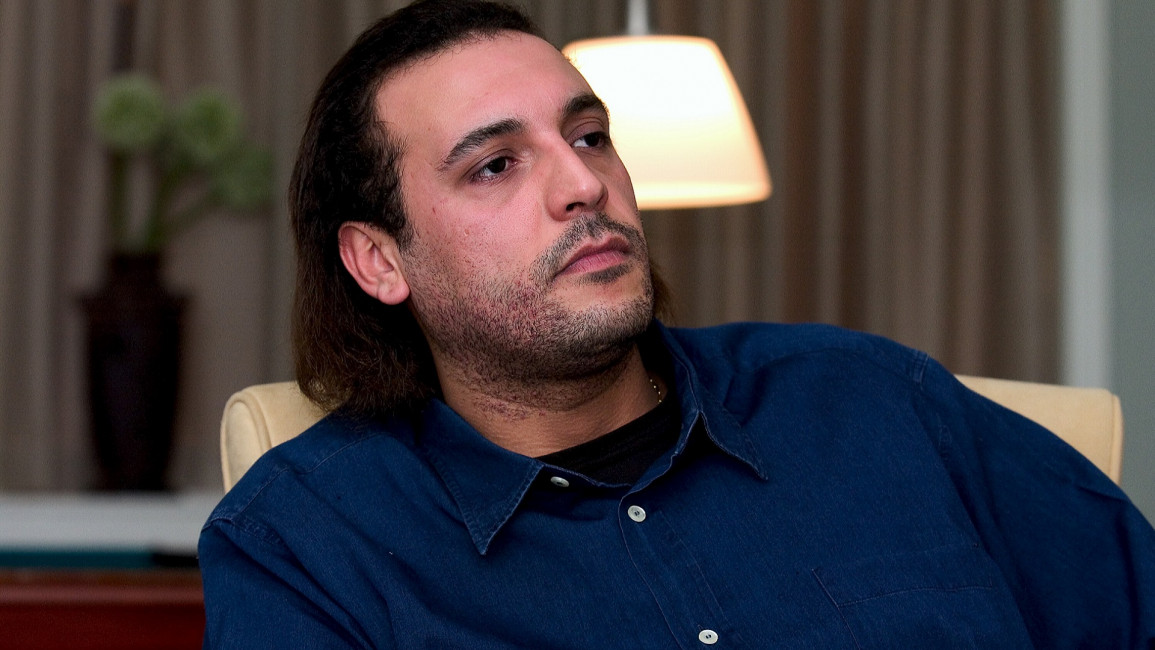Libya demands improvements after leaked photos show tiny cell of Muammar Gaddafi's son in Beirut
Leaked photographs of the son of Libya’s late dictator Muammar Gaddafi and the tiny underground cell where he has been held for years in Lebanon have raised concerns in the North African nation as Libyan authorities demand improvements.
The photos showed a room without natural light packed with Hannibal Gaddafi’s belongings, a bed and a tiny toilet. "I live in misery," local Al-Jadeed TV quoted the detainee as saying in a Saturday evening broadcast, adding that he is a political prisoner in a case he has no information about.
Two Lebanese judicial officials confirmed to The Associated Press on Monday that the photographs aired by Al-Jadeed are of Gaddafi and the cell where he has been held for years at police headquarters in Beirut. Gaddafi appeared healthy, with a light beard and glasses.
A person who is usually in contact with Gaddafi, a Libyan citizen, said the photos were taken in recent days. All spoke on condition of anonymity because they were not authorized to speak to media outlets.
Gaddafi has been held in Lebanon since 2015 after he was kidnapped from neighboring Syria, where he had been living as a political refugee. He was abducted by Lebanese militants demanding information about the fate of prominent Lebanese Shia cleric Musa al-Sadr, who went missing during a trip to Libya in 1978.
📸 | قناة الجديد اللبنانية تبث صور جديدة للرهينة والمعتقل السياسي #هانيبال_القذافي من داخل زنزانة ضيقة ومعتمة أكدت بأنها تقع تحت الأرض أسفل بمبنى أمن المعلومات في #بيروت وتنقل عنه قوله بأن وضعه سيء و لايشم الهواء ومعتقل في قضية لا يعرف عنها أي شيء في إشارة لقضية اختفاء الإمام… pic.twitter.com/rdOYou03sa
— صحيفة المرصد الليبية (@ObservatoryLY) April 27, 2024
The fate of al-Sadr has been a sore point in Lebanon. His family believes he may still be alive in a Libyan prison, though most Lebanese presume al-Sadr, who would be 95 now, is dead.
A Libyan delegation visited Beirut in January to reopen talks with Lebanese officials on the fate of al-Sadr and the release of Gaddafi. The talks were aimed at reactivating a dormant agreement between Lebanon and Libya, struck in 2014, for cooperation in the probe of al-Sadr. The delegation did not return to Beirut as planned.
The leaks by Al-Jadeed came after reports that Gaddafi was receiving special treatment at police headquarters and that he had cosmetic surgeries including hair transplants and teeth improvements. Al-Jadeed quoted him as saying: "Let them take my hair and teeth and give me my freedom."
Gaddafi went on a hunger strike in June last year and was taken to a hospital after his health deteriorated.
Libya’s Justice Ministry in a statement Sunday said Gaddafi is being deprived of his rights guaranteed by law. It called on Lebanese authorities to improve his living conditions to one that "preserves his dignity," adding that Lebanese authorities should formally inform the ministry of the improvements. It also said Gaddafi deserves to be released.
After he was kidnapped in 2015, Lebanese authorities freed him but then detained him, accusing him of concealing information about al-Sadr’s disappearance.
Al-Sadr was the founder of the Amal Movement, a Shia militia that fought in Lebanon’s 1975-90 civil war and later also became a political party that is currently led by the country’s Parliament Speaker Nabih Berri.
Many of al-Sadr’s followers are convinced that Muammar Gaddafi ordered al-Sadr killed in a dispute over Libyan payments to Lebanese militias. Libya has maintained that the cleric, along with two traveling companions, left Tripoli in 1978 on a flight to Rome.
Human Rights Watch issued a statement in January calling for Gaddafi's release. The rights group noted that Gaddafi was only 2 years old at the time of al-Sadr’s disappearance and held no senior position in Libya as an adult.


![President Pezeshkian has denounced Israel's attacks on Lebanon [Getty]](/sites/default/files/styles/image_684x385/public/2173482924.jpeg?h=a5f2f23a&itok=q3evVtko)



 Follow the Middle East's top stories in English at The New Arab on Google News
Follow the Middle East's top stories in English at The New Arab on Google News


